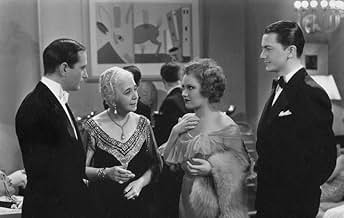Ajouter une intrigue dans votre langueA single mother struggles to raise her son and daughter, who find it difficult to listen to her life lessons. They forge their own lives, and make their own mistakes as a result.A single mother struggles to raise her son and daughter, who find it difficult to listen to her life lessons. They forge their own lives, and make their own mistakes as a result.A single mother struggles to raise her son and daughter, who find it difficult to listen to her life lessons. They forge their own lives, and make their own mistakes as a result.
Laura Hope Crews
- Mrs. Thomas
- (as Laura Hope Crewes)
Jay Eaton
- Party Guest
- (uncredited)
Bess Flowers
- Party Guest
- (uncredited)
Arthur Hoyt
- Art Student
- (uncredited)
Gus Leonard
- Art School Concierge
- (uncredited)
Paul Porcasi
- Concierge
- (uncredited)
Histoire
Le saviez-vous
- AnecdotesDonald Cook was injured in an automobile accident soon after the production had started, and was replaced by David Newell in the role of Duff Wilson.
- Citations
Mr. Thomas: Oh, I hate a pun. That is the lowest form of wit.
- ConnexionsFeatured in Myrna Loy: So Nice to Come Home to (1990)
- Bandes originalesGood Night Sweetheart
(1931) (uncredited)
Music by Ray Noble
Lyrics by Jimmy Campbell and Reginald Connelly
Whistled by Robert Young
Commentaire en vedette
This is a very ordinary precode involving the wealthy Thomases. The parents (Lewis Stone and Laura Hope Crews) are worried about their two grown children. Son Ralph (Robert Young) as well as daughter Phyl (Margaret Perry) are taken to partying every night and sleeping until noon. Ralph's individual demon is that he fancies himself more than a designer of wallpaper at the family business - he wants to go to France and become a great artist. Phyl's problem is that she is in love with a married man (David Newell as Duf) whose wife won't let him go. Both kids wind up doing what they want to do in spite of their parents' objections. Ralph does go to France to study art. Phyl sets up house with Duf with no hope of marriage in sight. So far this is an extraordinarily ordinary precode. So what makes it worthwhile? For one, one kid winds up with their hopes dashed the other gets their wish. Which one triumphs and which one does not and how this happens is the unexpected part. Also very interesting is a tryst Ralph has with a French neighbor when he is in Paris. That neighbor happens to be played by Myrna Loy and the nature of the tryst is what is so unexpected. In one scene she is complaining about the noise Ralph is making. In the next scene it is the next morning and she and Ralph are bouncing around in their pajamas! What's more we never see the French girl again in Ralph's life. How realistic that not every sexual encounter leads to either tragedy or the altar, which is something that would never be allowed in the production code era.
The ending is warm although abrupt as the kids grow a few years older and seem to be gradually becoming their parents. Plus both kids grow a genuine appreciation for Aunty Doe (Elizabeth Patterson), someone they ridiculed just a few years before as silly and out of touch.
This one is an OK time passer, but there really is nothing out of the ordinary to distinguish it from other precodes of the era other than the chance to see two stars just starting out - Myrna Loy and Robert Young - and one star of the stage making a rare film appearance - Margaret Perry.
The ending is warm although abrupt as the kids grow a few years older and seem to be gradually becoming their parents. Plus both kids grow a genuine appreciation for Aunty Doe (Elizabeth Patterson), someone they ridiculed just a few years before as silly and out of touch.
This one is an OK time passer, but there really is nothing out of the ordinary to distinguish it from other precodes of the era other than the chance to see two stars just starting out - Myrna Loy and Robert Young - and one star of the stage making a rare film appearance - Margaret Perry.
- AlsExGal
- 23 déc. 2012
- Lien permanent
Meilleurs choix
Connectez-vous pour évaluer et surveiller les recommandations personnalisées
Détails
- Date de sortie
- Pays d’origine
- Langues
- Aussi connu sous le nom de
- After All
- Lieux de tournage
- Immanuel Presbyterian Church - 3300 Wilshire Blvd., Los Angeles, Californie, États-Unis(church at beginning of film.)
- société de production
- Consultez plus de crédits d'entreprise sur IMDbPro
- Durée1 heure 15 minutes
- Couleur
- Rapport de forme
- 1.37 : 1
Contribuer à cette page
Suggérer une modification ou ajouter du contenu manquant

Lacune principale
By what name was New Morals for Old (1932) officially released in Canada in English?
Répondre




































